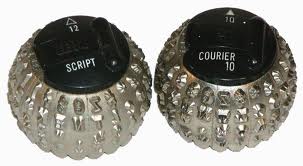I remember when the library had one piece of equipment to use to process new books: a typewriter. And we had a cadillac: the beautiful IBM Selectric typewriter. But now it's so old my spell check doesn't even recognize it.
axsoris.com
I thought I was very high tech when I added two more 'type elements' or 'typeballs' which gave me two more different fonts, for a total of three fonts! Now we have dozens, if not hundreds of fonts to choose from at the click of a mouse. It's hard to believe how technology in the library has changed in such a short period of time.
officemuseum.com
We used the typewriter to type out the check-out cards and all the cards for the card catalog. For you young librarians, the card catalog looked like this:
wisegeek.org
The card catalog was a cabinet of multiple long, narrow drawers containing thousands of index-size cards for each book author, title, and subject cards primarily for nonfiction books. The cabinet itself was usually built of oak or some other beautiful wood. Each drawer was labeled and organized alphabetically. Tell your students that this is how library patrons found the books or information they were seeking. Manually. Tediously. Slow.
It took a LOT of typing to prepare those cards, and we were so relieved when computers came on the scene, along with software that printed out the catalog cards for us after we typed in the necessary information. But filing them in the card catalog was still done manually, tediously. Slow.
etsy.com
Part of the old check-out process involved patrons pulling out a card from a pocket inside the front or back cover or flyleaf page and writing their name or library number on it. The librarian would stamp the due date on the pocket or due date sheet so the patron would know when the book was due. The card would also get stamped and filed. When the book was returned, the card was inserted in the pocket and then shelved.
brianjamestheauthor.blogspot.com
When privacy became an issue, we were told that we had to take a black marker and mark out all of the names on the check-out cards so no one would know who had checked out a book. It was heartbreaking for me to mark out the signatures of patrons who had passed or moved away; it felt like I was erasing history. I even saw the progression of the ages of my own children on those check-out cards-- from writing their first wobbly letters to neatly printing their names and later dates writing in cursive. After a while I put down the marker. If people wanted privacy, they could use their library numbers. But automation eventually solved the privacy issue.
Automating a library collection was tedious, but the results could be compared to switching from a horse and buggy to a jet airplane. And the most recent new trend in library services is checking out e-books from home or anyplace else using a mobile device. I love visiting the library, but sometimes it's more convenient to bring the library to me. I have fond memories of those old check-out cards, but I'm thrilled to be riding on that jet.




